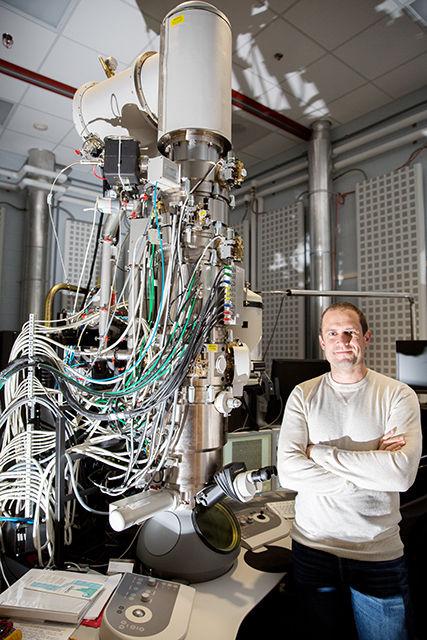Although nanotechnology is a relatively new area of science, it has already provided the world with seemingly futuristic products. The innovation of nanotechnology can be seen in products such as artificial muscle fibers and bacteria-repellent textiles. Unfortunately, there are several barriers to the advancement of nanotechnology. NC State, UNC-Chapel Hill and Duke have partnered to help overcome these barriers and make nanotechnology more accessible to students, educators and the general public.
Nanotechnology is a type of technology that applies the principles of science on an extremely small scale.
“Nanotechnology is the purposeful manipulation of matter at the atomic scale; an example, the designing and building of materials at a very small scale,” said James Bonner, a professor of biology and a nano-researcher.
Since the development of nanotechnology requires the study of materials at the atomic level, it can be quite expensive for research to access the resources needed. NC State is leading the partnership that hopes to enable easier research and quicker development of nanotechnology.
The three-school partnership is called the Research Triangle Nanotechnology Network and is part of the National Science Foundation’s Nanotechnology Initiative program. The goal of the National Science Foundation is to create better infrastructure within the discipline of nanotechnology through the sharing of data and resources between research institutions. The Triangle was recently chosen as one of 16 locations to host the Nanotechnology Initiative program.
“The National Science Foundation wants researchers to be able to access tools so they can be innovative,” said Jacob Jones, a professor of materials science and engineering and principal investigator of Research Triangle Nanotechnology Network.
RTNN is using the monetary support of the National Science Foundation to develop and hire workers for the program. Once the program is fully established, researchers and educators throughout the Triangle and the surrounding area will have unprecedented access to nanotechnology tools and information.
The biggest barrier to the advancement of nanotechnology is cost. Tools such as electron microscopes are essential to the field, but they can cost millions of dollars. This greatly limits researchers who may not have the funding to access the tools necessary for their studies. RTNN hopes to conquer the cost barrier by providing the tools and information needed at no cost to the researcher.
“Cost is a big hindrance, especially to educators,” Jones said. “Most universities charge for access to their resources. People don’t want to be sent a bill for $100,000-200,000.”
College students, individual researchers, corporations and anyone else interested in nanotechnology will be able to submit an application to access the resources of RTNN. Once the application is filed, these external constituents will have access to the resources of all three Triangle universities and several other members of the partnership.
Each university has its own unique advantages to offer to the network. NC State’s focus will be on providing studies in non-traditional nanotechnology applications.
“NC State has unique things to offer to the network. We have nontraditional applications of nanotechnology like agriculture, forestry and biomaterials,” Jones said.
Another barrier researchers often face is not having the credentials to operate a specific piece of equipment such as an electron microscope. Through RTNN, researchers will be able to have qualified technicians carry out any measurements they need.
The distance from the facilities needed to conduct experiments is another problem researchers sometimes face. RTNN hopes to combat the issue of distance by developing a peer-to-peer research program. Through this program, researchers will be able to Skype another researcher at the institution who has the tools the researchers need. Their peer will then conduct the needed measurements and send the results to the researcher.
While RTNN will greatly aid the formal study of nanotechnology, it also seeks to enhance the learning experience of K-12 students. The network will partner with the Morehead Planetarium at UNC-CH to host Nano-Nights. These nights will provide a fun opportunity for young students to learn about the discipline of nanotechnology.
Jones says it will be several months before the RTNN program reaches equilibrium, but he has big goals for the future.
“I want to see a significant number of people from outside the university that used our facilities to invent new things,” Jones said. “I want to be able to count the number of patents and the number of start-ups that got their start within our facilities.”








